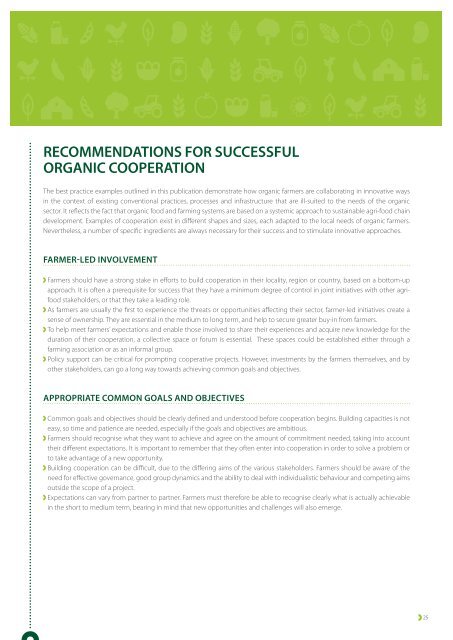ORGANIC COOPERATIVE APPROACHES TO RURAL DEVELOPMENT
Qgy8k
Qgy8k
You also want an ePaper? Increase the reach of your titles
YUMPU automatically turns print PDFs into web optimized ePapers that Google loves.
RECOMMENDATIONS FOR SUCCESSFUL<strong>ORGANIC</strong> COOPERATIONThe best practice examples outlined in this publication demonstrate how organic farmers are collaborating in innovative waysin the context of existing conventional practices, processes and infrastructure that are ill-suited to the needs of the organicsector. It reflects the fact that organic food and farming systems are based on a systemic approach to sustainable agri-food chaindevelopment. Examples of cooperation exist in different shapes and sizes, each adapted to the local needs of organic farmers.Nevertheless, a number of specific ingredients are always necessary for their success and to stimulate innovative approaches.FARMER-LED INVOLVEMENTFarmers should have a strong stake in efforts to build cooperation in their locality, region or country, based on a bottom-upapproach. It is often a prerequisite for success that they have a minimum degree of control in joint initiatives with other agrifoodstakeholders, or that they take a leading role.As farmers are usually the first to experience the threats or opportunities affecting their sector, farmer-led initiatives create asense of ownership. They are essential in the medium to long term, and help to secure greater buy-in from farmers.To help meet farmers’ expectations and enable those involved to share their experiences and acquire new knowledge for theduration of their cooperation, a collective space or forum is essential. These spaces could be established either through afarming association or as an informal group.Policy support can be critical for prompting cooperative projects. However, investments by the farmers themselves, and byother stakeholders, can go a long way towards achieving common goals and objectives.APPROPRIATE COMMON GOALS AND OBJECTIVESCommon goals and objectives should be clearly defined and understood before cooperation begins. Building capacities is noteasy, so time and patience are needed, especially if the goals and objectives are ambitious.Farmers should recognise what they want to achieve and agree on the amount of commitment needed, taking into accounttheir different expectations. It is important to remember that they often enter into cooperation in order to solve a problem orto take advantage of a new opportunity.Building cooperation can be difficult, due to the differing aims of the various stakeholders. Farmers should be aware of theneed for effective governance, good group dynamics and the ability to deal with individualistic behaviour and competing aimsoutside the scope of a project.Expectations can vary from partner to partner. Farmers must therefore be able to recognise clearly what is actually achievablein the short to medium term, bearing in mind that new opportunities and challenges will also emerge.25


